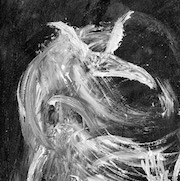Matthew Bower and Samantha Davies continue their prodigious swell of releases over the past few years (as well as Skullflower, they’ve also uploaded recordings as Sunroof! and Voltigeurs to Bandcamp, and collaborated with Black Leather Jesus as Erzulie Scorpione) but there’s a slight twist for this new album on Egypt’s righteous Nashazphone label: for the first time, by my reckoning, since 2009’s Vile Veil (apart from a split album with Mastery), enthusiasts of Skullflower’s unique and mind-melting form of blackened psychedelia can drink in the hell-born swells and saturations on vinyl.
Vinyl is interesting because in comparison to recent CD releases, it puts something of a restriction on the time Bower and Davies have to play with and exist in. CD albums like Strange Keys to Untune God’s Firmament and Draconis (and the upcoming The Spirals of Great Harm) were colossal, track after track of squalling feedback and time-stretching drone, the results often stretching over two hours in total. If noise is intended to be a challenging experience, Skullflower – who actually are more subtle and intricate than your average noise act – achieve it with the sheer expanse of what they are trying to achieve. At 44 minutes in length, The Black Iron That Fell From The Sky, To Dwell Within (Bear It or Be It) (from here-on shortened to The Black Iron!) is hardly short, but it demonstrates that even Skullflower have an ability to be concise.
If anything, the restraint as far as Skullflower go would be more metaphysical than musical. Davies and Bower aren’t noisy for noise’s sake. I doubt they would even really see themselves as a noise act. For them, their music is a quest. Well-versed in gnostic philosophy and the mythologies of civilisations long gone, they use their guitars as a means of conjuring up a ritualistic atmosphere for the summoning of ancient forces. In the Bandcamp liner notes references abound to spirits, gods, demons and natural forces in elliptic language that obfuscates meaning rather than evinces it, but on record and especially stage, it all coalesces into something frighteningly real. Live, the duo crouches, reverential, with backs to the audience, sometimes surrounded by a haze of incense, and stare skywards as if before an altar only they can see. It’s to this day one of the most intense musical experiences I’ve ever felt. They may not have two hours to explore on The Black Iron… but if anything they plunge deeper into their own haze than ever before.
As mentioned, the electric guitar is Davies and Bower’s shaking stick of predilection, and from the opening bars of side A, their twin axes are swinging and swirling in full force. A crunching single note like the start of a heavy metal riff gets warped and extended over and over, stretched out over a buzzing ocean of feedback and drone. It’s hard to tell where one guitar starts and the other ends, as is ever the case with Skullflower, they’re both simply locked in sync, screaming as one into the void. The riffs, if they can be called that, are circular, a constantly rotating miasma of saturation and noise whilst an overloaded synthesizer may or may not be anchoring the furore with a swirling drone. The album title suggests falling bombs and resultant chaos, and this motif is picked up later on side A with thumping chords that seem to burst against the seethe of drone like rockets crashing into buildings. On the second side, one of Bower or Davies (or both) transforms his or her guitar into an air-raid siren, great keening notes screaming outwards to warn of imminent danger and death.
The solitary piece stretches on and on for over twenty minutes, the noise equivalent of a late sixties psychedelic wander through the spheres, as glimmering synths glimmer like bursts of light in a night sky. This is what’s left of rock’s DNA repurposed as apocalyptic terror, the promise of destruction with only the barest hint of hope for survival (“bear it or be it”). It’s Skullflower’s most overpoweringly, terrifyingly beautiful album since Malediction.


